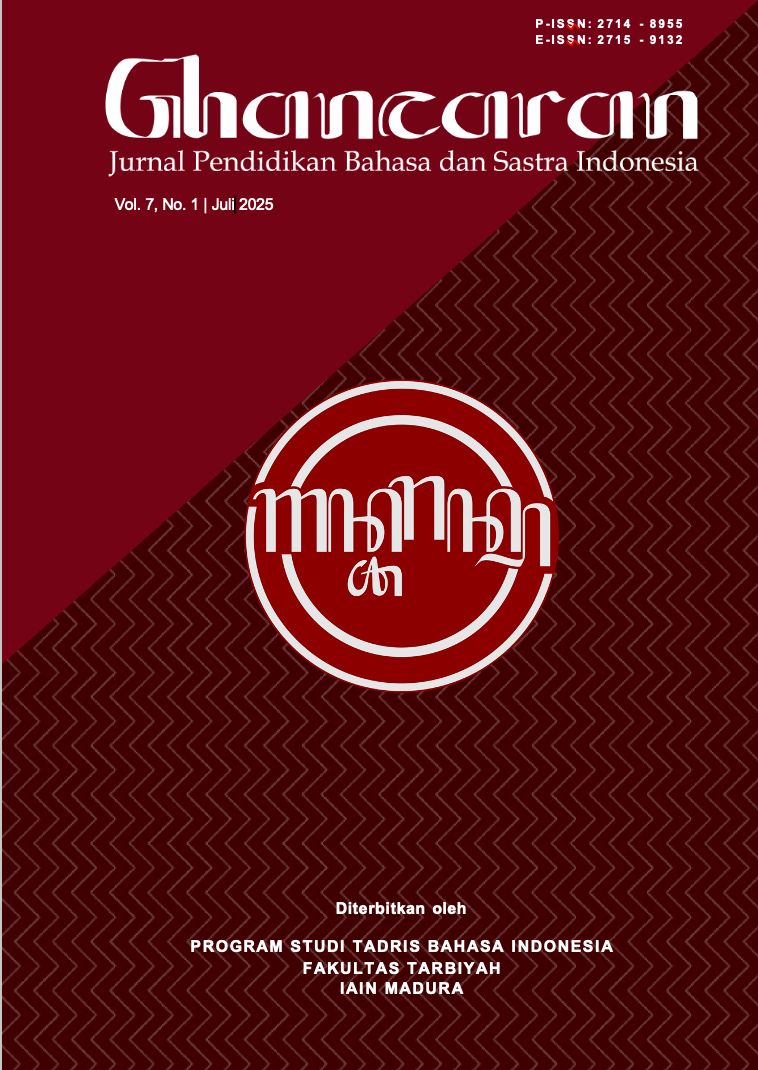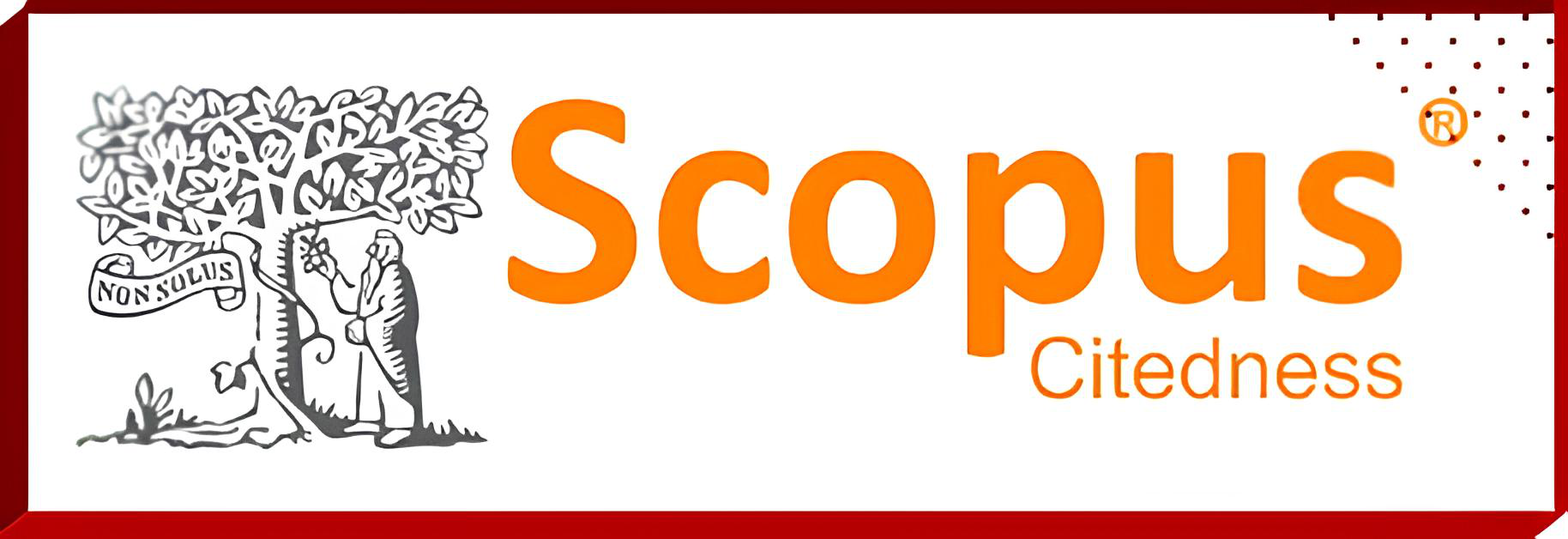Exploration of the Role of Women in the Novel Baitun Nakhil by Tarek Eltayeb: A Study of Ecofeminism
 Abstract views: 247
,
Abstract views: 247
,
 PDF downloads: 218
PDF downloads: 218
Abstract
Women have a close relationship with nature, especially in traditional environments, so patriarchy and environmental damage are related from the perspective of ecofeminism. This research was conducted to understand and criticize feminine principles and characters that can protect the environment and nature. This research is descriptive qualitative. Primary data is obtained from narratives and dialogues contained in the novel, while secondary data comes from various books and journal articles related to the theme of discussion. Data were collected using reading and note-taking techniques and then analyzed using the Miles and Huberman method: data reduction, data pr esentation, and conclusion drawing. From this study, it can be concluded that the ecofeminism activities contained in the novel Baitun Nakhil are (1) colonialism and patriarchy in the narrative that describes the exploitation and domination of marginalized people and nature, such as the attack of armed groups on villagers and authoritarian family heads; (2) women's role in the sustainability of nature is in the form of environmental education and women's ability to maintain and provide the necessities of life; (3) social and environmental justice that can be assessed by the negative impact of deviant and dominating hierarchies such as the urbanization that occurred in the city of Al-Shams which resulted in the extinction of animal and plant habitats and ecosystems. Thus, the novel Baitun Nakhil by Tarek Eltayeb indirectly voices the message of ecofeminism in the form of narratives and dialogues that show that loving, caring, and sensitive attitudes are the initial capital to be able to care for nature and the environment.
Downloads
References
Afrin, S., & Shammi, M. (2023). A Review on the Gendered Impact of COVID-19 Pandemic Towards Achieving Sustainable Development Goals in Bangladesh: Ecofeminist Perspectives on The Response to COVID-19 Pandemic. Heliyon, 9(3): 1-14.
Ahmad, Ahmad Mohammad Abd Al-salam. (2016). Aspects of Ecofeminism in the Poetry of Fadwa Tuqan and Linda Hogan. Occasional Papers in the Development of English Education, 62(1): 197-218.
Bhat, S. M. & Ganaie, J. A. (2021). Ecofeminism: Deracinating the Patriarchy. Turkish Online Journal of Qualitative Inquiry, 12(6): 5591-5604.
Boswell, R. (2023). Sensory Ecofeminism for Heritage, Tourism, and Sustainability in Mauritius. Sustainability, 15(13): 1-19.
Chang, K. Y. (2023). Composting Ecofeminism: Caring for Plants, Animals, and Multispecies Flourishing in Molly Chester’s Dream Farm. Humanities, 12(3): 1-14.
Christou, A. (2024). Ecofeminism and the Cultural Affinity to Genocidal Capitalism: Theorising Necropolitical Femicide in Contemporary Greece. Social Sciences, 13(5): 1-12.
Efendi, A. N., Ahmadi, A., Indarti, T., & Kurniawati, E. (2025). Local Voices, Ecological Narratives, and Postcolonial Struggles: An Eco-Postcolonialism Reading of Indonesian Literature. The International Journal of Critical Cultural Studies, 24(1), 137–154.
Efendi, A. N., Ahmadi, A., Indarti, T., Kurniawati, E., Sya’adah, H., Sanubarianto, S. T., Sa’diyah, I. & Rokhmawati, Z. (2025). Sosial Retro-Prospective Analysis of Indigenous Ecological Narratives: Ecosemiotic-Cultural Perspectives on Sustainable Development. ENTITA: Jurnal Pendidikan Ilmu Pengetahuan Sosial dan Ilmu-Ilmu, 205–220.
Ersöz, A. (2022). Vandana Shiva’nin Ekofeminizme Katkilari Üzerine Bir Değerlendirme. Uluslararası Anadolu Sosyal Bilimler Dergisi, 6(4): 1374-1385.
Gaard, G. (1993). Living Interconnections with Animals and Nature. In Ecofeminism, 1-12.
Gebreyohannes, N. M., & Ambachew, A. D. (2022). Women’s Perceptions of Nature: An Ecofeminist Analysis of Tsitsi Dangarembga’s This Mournable Body. Humanities, 11(6): 1-15.
Gebreyohannes, N. M., & David, A. D. (2022). Women and Nature: An Ecofeminist Reading of Chimamanda Ngozi Adichie’s Purple Hibiscus. Literature, 2(3): 179-188.
Haq, Z. A., Imran, M., Ahmad, S., & Farooq, U. (2020). Environment, Islam, and women: a study of eco-feminist environmental activism in Pakistan. Journal of Outdoor and Environmental Education, 23(3), 275–291.
Jannah, A., & Efendi, A. N. (2024). Kajian Ekologi Sastra (Ekokritik) dalam Antologi Puisi Negeri di atas Kertas Karya Komunitas Sastra Nusantara: Perspektif Lawrence Buell. GHANCARAN: Jurnal Pendidikan Bahasa dan Sastra Indonesia, 77-90.
Kitch, S. L. (2023). Reproductive Rights and Ecofeminism. Humanities (Switzerland), 12(2): 1-19.
Lestari, E. D. (2020). Relasi Pribumi dan Kolonialis dalam Cerpen “Kutukan Dapur” Karya Eka Kurniawan (Tinjauan Postkolonial). GHANCARAN: Jurnal Pendidikan Bahasa dan Sastra Indonesia, 2(1): 23-35.
Liu, P. (2024). Laozi’s Ecofeminist Ethos: Bridging Ancient Wisdom with Contemporary Gender and Environmental Justice. MDPI, 15(5), 1–24.
Liu, Y., Anser, M. K., & Zaman, K. (2021). Ecofeminism and Natural Resource Management: Justice Delayed, Justice Denied. Sustainability, 13(13): 1-21.
Marrero, A. B. (2024). Conflicts and Proposals for an Antispeciesist Ecofeminist Consideration of Nonhuman Animals in Disaster Contexts. Philosophies, 9(3): 1-11.
McNeil, E. (2022). Indigenous and Ecofeminist Reclamation and Renewal: The Ghost Dance in Silko’s Gardens in the Dunes. Humanities, 11(4): 1-15.
Mickey, S., & Vakoch, D. A. (Eds.). (2018). Women and Nature?: Beyond Dualism in Gender, Body, and Environment. New York: Routledge.
Miles, M. B., Huberman, M., & Saldana, J. (2014). Qualitative Data Analysis: A Methods Sourcebook. London: SAGE Publications Ltd.
Muhammad, N. U. (2022). Ecofeminist Theology in Islam: The Process and Application of Synthesizing Rosemary Radford Ruether’s Insights, Islamic Feminist Aspirations, and Ecological Concerns. Claremont Graduate University.
Nirmala, B. N., & Basid, A. (2024). Modernization in Environmental Change in the Novel ‘Baitun Nakhil’ by Eltayeb: Greg Garrard’s Ecocritical Study. Eralingua: Jurnal Pendidikan Bahasa Asing dan Sastra, 8(1), 166–186.
Plumwood, V. (2019). Feminism and the Mastery of Nature. New York: Routledge.
Prakash, A., Engheepi, V., & Sinha, S. (2024). Intersecting pathways: Eco-feminist perspectives on intersectionality, water management, and responsible tourism for gender-inclusive community development. Current Research in Environmental Sustainability, 7: 1-10.
Sani, F. F. (2023). Kritik terhadap Wacana Patriarki dalam Novel La Civilisation, ma Mère !... Karya Driss Chraïbi. Diglosia: Jurnal Kajian Bahasa, Sastra, dan Pengajarannya, 6(2): 573-596.
Sarkar, U. (2022, January 17). Literature and Environment: The Importance of Ecofeminist Fiction In Environmental Protection. Available online: https://feminisminindia.com/2022/01/17/importance-of-ecofeminist-fiction-in-environmental-protection/.
Shiva, V. (1988). Staying Alive: Women, Ecology and Survival in India. New Delhi: Kali for Women
Shiva, V., & Jhamtani, H. (1997). Bebas dari Pembangunan: Perempuan, Ekologi dan Perjuangan Hidup di India. Jakarta: Yayasan Obor Indonesia.
Shiva, V., & Mies, M. (2014). Ecofeminism. New York: Bloomsbury Publishing.
Štante, N. F. (2024). Is There a Place for Pantheism in (Post-)Christian Ecofeminist Reconstruction of the God/Goddess–World Relationship. Religions, 15(1): 1-13.
Suka, I. G. (2012). Teori Lingkungan Antroposentrisme: Antroposentrisme, Ekofeminisme & Ekosentrisme. Denpasar: Udayana University Press.
Sulistiyo, U. (2023). Buku Ajar Metode Penelitian Kualitatif. Jambi: PT Salim Media Indonesia.
Sultan, S. Y., & ElSherbini, A. A. (2023). An Ecofeminist Perspective of the Alternate-History Novel Pastwatch: The Redemption of Christopher Columbus. Humanities, 12(4): 1-12.
Warren, K. J. (1997). Ecofeminism: Women, Culture, Nature. Bloomingtoon: Indiana University Press.
Wijayanti, F. A., Alayya, S. I., & Susanto, D. (2024). Subalternitas Perempuan Tionghoa dalam Novel Mei Merah 1998: Kala Arwah Berkisah. Adabiyyāt: Jurnal Bahasa dan Sastra, 8(2): 150–172.
Yunus R.H, M., & Efendi, A. N. (2024). Analisis Ekokritik pada Novel “Coretan-Coretan Sunyi” Karya Ngangga Saputra. GHANCARAN: Jurnal Pendidikan Bahasa dan Sastra Indonesia: 335-348.
الشقرفى, ا. م. م. (2021). An Ecofeminist Reading of Salwa Bakr’’’’s "Thirty-One Beautiful Green Trees " and ‘Worms at the Flower Garden’. مجلة کلیة الآداب جامعة الفیوم, 13(1), 379–408. doi:10.21608/jfafu.2021.46898.1221
الطيب، طارق. (2014). بيت النخيل. وزراة الثقافة المصرية الهيئة العامة لمقصور الثقاقة.
Copyright (c) 2025 GHANCARAN: Jurnal Pendidikan Bahasa dan Sastra Indonesia

This work is licensed under a Creative Commons Attribution-ShareAlike 4.0 International License.
Ghancaran: Jurnal Pendidikan Bahasa dan Sastra Indonesia uses an Open Access Policy under the Creative Commons Attribution-ShareAlike 4.0 International License. Authors publishing in this journal agree to the following terms:
- Ghancaran Journal holds the copyright and grants the journal rights for first publication with the work simultaneously licensed under a

The work is distributed under Creative Commons Attribution-ShareAlike 4.0 International License which allows others to share, copy, and redistribute the material in any media or format and adapt, remix, change, and develop the material even for commercial purposes, as long as it is stated credit and license derivative works under similar terms. - Authors may make additional contractual arrangements for non-exclusive distribution of the journal's published work version.
- Authors are permitted to post their work online (e.g., in institutional repositories or on their websites) before and during submission, as doing so may lead to productive exchange.



















